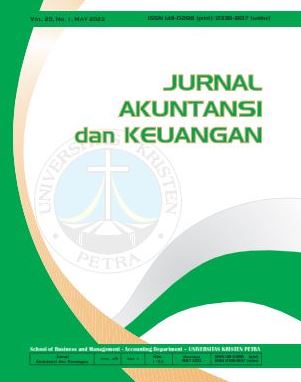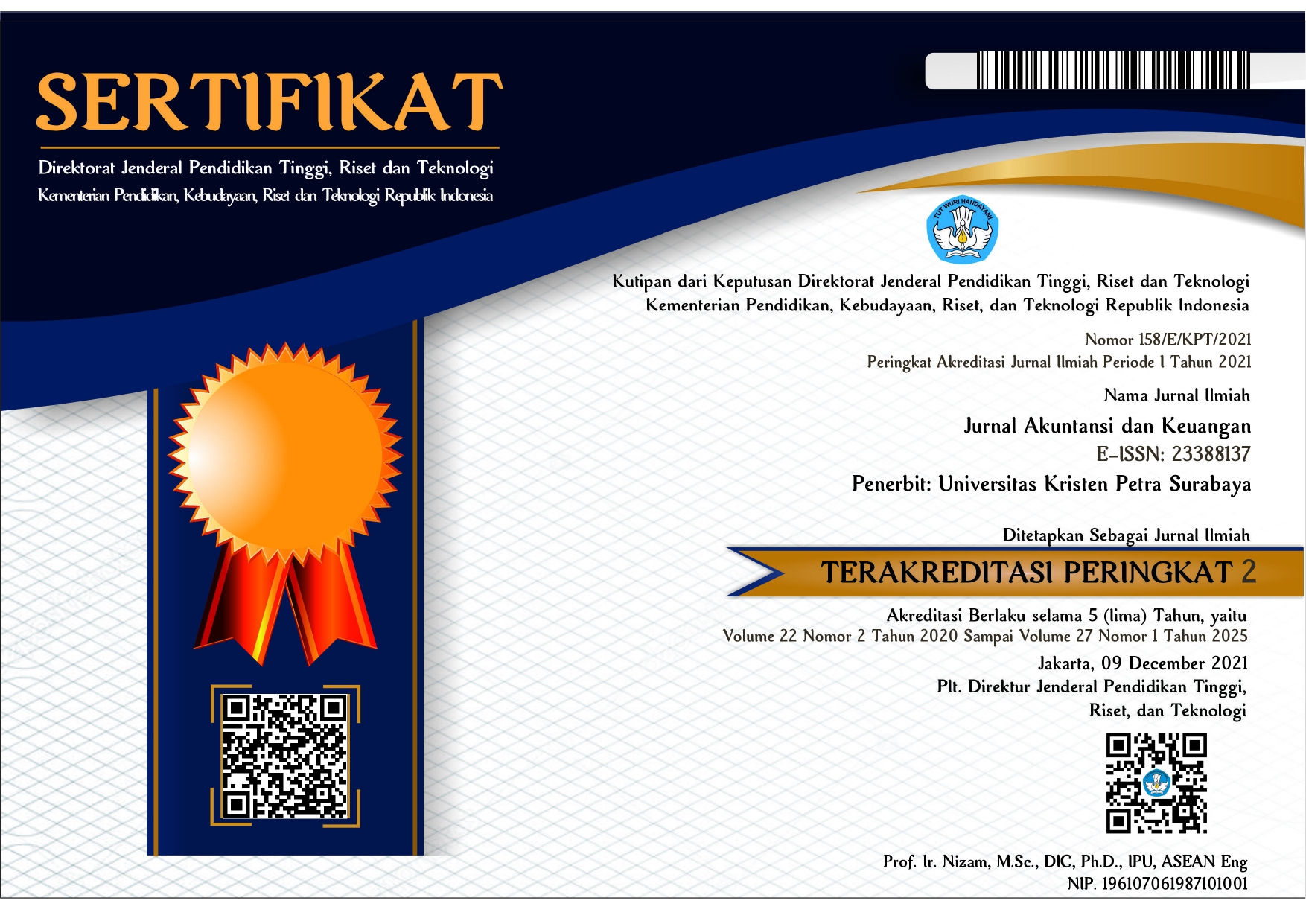Ethical Perceptions of Tax Avoidance and Spiritual Balance Dimensions
DOI:
https://doi.org/10.9744/jak.25.2.69-78Keywords:
Business, ethics, gender, spirituality, tax avoidanceAbstract
This research is about tax avoidance viewed from the perspective of gender and business scale in analyzing ethical perceptions. This study was conducted using primary data by collecting questionnaires distributed to small and medium-sized industrial entrepreneurs in the province of Bali. The samples used were 52 female entrepreneurs and 48 male entrepreneurs. A comparison of ethical perceptions of tax avoidance was tested using Wilcoxon. The research shows no significant difference between the ethical perceptions of small and medium entrepreneurs on tax avoidance and the moral perceptions of male and female entrepreneurs. The correct tax policy must convince taxpayers to fulfil their obligations, primarily through a spiritual dimension that can strengthen taxpayers' confidence not to commit moral hazard. This study adopts the concept of Rwa Bhineda because today's world will lead to the black-and-white era referred to as Rwa Bhineda.
References
Alstadsater, A., Johannesen, N., & Zucman, G. (2017). Tax Evasion and Tax Avoidance (No. 23772; NBER Working Paper). http://gabriel-zucman.eu/files/AJZ2018b.pdf
Ansar, R., Mahdi, S. A. R., & Susi, W. (2018). The Relationship of Money Ethics on Tax Evasion with Intrinsic Religiosity, Extrinsic Religiosity, and Materialism as Moderating Variables (Case on Private Taxpayers Listed in KPP Pratama Ternate). Jurnal Accoun¬tability, 7(2), 33–47. https://doi.org/10.32400/ja.24691.7.02.2018.33-47
Bame-Aldred, C. W., Martin, K. D., Cullen, J. B., & Parboteeah, K. P. (2013). National Culture and Firm-Level Tax Evasion. Journal of Business Research, 66(3), 1–7. https://doi.org/10.1016/j.jbusres.2011.08.020
Beer, S., Mooij, R. de, & Liu, L. (2018). International Corporate Tax Avoidance: A Review of the Channels, Magnitudes, and Blind Spots (WP/18/168).
Budiarto, D. S., Yennisa, & Widyaningrum, R. (2018). Does Religiosity Improve Tax Compliance? An Empirical Research Based From Gender. Jurnal Dinamika Akuntansi, 10(1), 82–90. https://doi.org/10.15294/jda.v10i1.12997
Chan, H. F., Dulleck, U., Fooken, J., Moy, N., & Torgler, B. (2022). Cash and the Hidden Economy: Experimental Evidence on Fighting Tax Evasion in Small Business Transactions. Journal of Business Ethics. https://doi.org/10.1007/s10551-022-05186-y
Chully, A. A. (2017). Gender Differences in Ethical Sensitivity in the Indian Business Context. Ushus-Journal of Business Management, 16(3), 11–25. https://doi.org/10.12725/ujbm.40.2
Coelho, M., Davis, A., Klemm, A., & Buitron, C. O. (2022). Gendered Taxes: The Interaction of Tax Policy with Gender Equality (WP/22/26; IMF Working Paper, Fiscal Affairs Department).
D’Attoma, J., Volintiru, C., & Malezieux, A. (2018). Gender, Social Value Orientation, and Tax Compliance (No. 7372; CESifo Working Paper).
Darmayasa, I. N., & Aneswari, Y. R. (2015). The Ethical Practice of Tax Consultant Based on Local Culture. Procedia - Social and Behavioral Sciences, 211, 142–148. https://doi.org/10.1016/j.sbspro.2015.11.021
David, P., & Semerád, P. (2014). Possibilities of Measuring Tax Evasion Related to Fuel Sale. Procedia Economics and Finance, 121–129. https://doi.org/10.1016/S2212-5671(14)00 327-X
Dewanta, M. A., & Machmuddah, Z. (2019). Gender, Religiosity, Love of Money, and Ethical Perception of Tax Evasion. Jurnal Dinamika Akuntansi Dan Bisnis, 6(1), 71–84. https://doi.org/10.24815/jdab.v6i1.10990
Drogalas, G., Anagnostopoulou, E., Pazarskis, M., & Petkopoulos, D. (2018). Tax Ethics and Tax Evasion, Evidence from Greece. Theoretical Economics Letters, 8(5), 1018–1027. https://www.scirp.org/pdf/TEL_2018041314211714.pdf
Ebimobowei, A., & Keretu, O. J. (2011). Mandatory Rotation of Auditors on Audit Quality, Costs and Independence in South-South, Nigeria. International Business Management, 5(3), 166–172. https://doi.org/10.3923/ibm.2011.166.172
Goel, P. (2018). Gender Differences in Perception of Ethical Practices (Empirical Study of Selected Sectors in India). Journal of General Management Research, 5(2), 28–38.
Gunawan, H., & Melisa. (2017). The Relationship Between Gender and Tax Payments. Journal of Applied Accounting and Taxation, 2(2), 209–215.
Hassen, A.-T. L., & Abdul-Jabbar, H. (2018). Geopolitical Differences and Tax Non-compliance Among Yemeni SMEs. Journal of Business Management and Accounting, 8(1), 31–45.
Hogue, M., Levashina, J., & Hang, H. (2013). Will I Fake It? The Interplay of Gender, Machiavellianism, and Self-monitoring on Strategies for Honesty in Job Interviews. Journal of Business Ethics, 117(2), 399–411. https://www.jstor.org/stable/42001857
Holmes, K., Randal, J., & Marriott, L. (2012). Ethics and Experiments in Accounting: A Contribution to the Debate on Measuring Ethical Behaviour. Pacific Accounting Review, 24(1), 80–100. https://doi.org/10.1108/01140581211221560
Hoseini, M., Gerayli, M. S., & Valiyan, H. (2019). Demographic Characteristics of the Board of Directors’ Structure and Tax Avoidance. International Journal of Social Economics, 46(2), 199–212. https://doi.org/10.1108/ IJSE-11-2017-0507
Inderpreet. (2016). Are Women More Ethical Than Men? - A Study Exploring Gender Behaviour at Work. International Journal of Management and Commerce Innovations, 3(2), 1063–1067.
Itashiki, M. (2011). Explaining “Everyday Crime”: a Test of Anomie and Relative Depriation Theory. University of North Texas.
Jarboui, A., Kachouri, B. S. M., & Riguen, R. (2020). No Title. Journal of Financial Crime, 27(4), 1389-1408(20). https://doi.org/10.1108/JFC-09-2019-0122
Jereb, E., Urh, M., Jerebic, J., & Šprajc, P. (2018). Gender differences and the awareness of plagiarism in higher education. Social Psychology of Education, 21(2), 409–426. https://doi.org/10.1007/s11218-017-9421-y
Ka, P. S. (2017). Quasi Justice In Administrative Court On Tax Objections. International Journal of Business, Economics and Law, 14(4), 113–119.
Kim, J.-H., & Lee, J.-H. (2021). How CEO Political Connections Induce Corporate Social Irresponsibility: An Empirical Study of Tax Avoidance in South Korea. Sustainability, 13(14), 7739. https://doi.org/10.3390/su13147739
Kusuma, M., & Rahayu, P. (2022). Can Other Comprehensive Income be Used for Tax Avoidance? Jurnal Akuntansi Dan Keuangan, 24(2), 68−79. https://doi.org/10.9744/jak.24.2.68−79
Mangoting, Y., Charysta, V., Martina, D., & Fransiska, S. (2019). Transparency as Anticipation of Tax Avoidance Behavior through Corporate Social Responsibility. Jurnal Dinamika Akuntansi, 11(1), 15–25.
Marandu, E. E., Mbekomize, C. J., & Ifezue, A. N. (2015). Determinants of Tax Compliance: A Review of Factors and Conceptualizations. International Journal of Economics and Finance, 7(9), 207–218. https://doi.org/10.5539/ijef.v7n9p207
McGee, R. W. (2011). The Ethics of Tax Evasion-Perspectives in Theory and Practice. Springer.
McGee, R. W. (2014). Gender and the Ethics of Tax Evasion: An Empirical Study of 82 Countries.
McGee, R. W., Aljaaidi, K. S., & Musibah, A. S. (2012). The Ethics of Tax Evasion: A Survey of Administrative Sciences Students in Yemen. International Journal of Business and Management, 7(16), 1–12. https://doi.org/10.5539/ijbm.v7n16p1
McGee, R. W., & Salimi, A. Y. (2018). The Ethics of Tax Evasion: A Survey of Chinese Business Students in Usa and China. Journal of Accounting and Finance, 1–8. https://doi.org/10.2139/ssrn.3182629
Messner, S., & Rosenfeld, R. (2001). Crime and the American Dream. Wadsworth.
Nurkhin, A., Novanty, I., Muhsin, M., & Sumiadji, S. (2018). The Influence of Tax Understanding, Tax Awareness and Tax Amnesty toward Taxpayer Compliance. Journal of Finance and Banking, 22(2), 240–255. https://doi.org/10.26905/jkdp.v22i2.1678
Ozili, P. K. (2020). Tax Evasion and Financial Instability. Journal of Financial Crime, 27(2), 531–539. https://doi.org/10.1108/JFC-04-2019-0051
Pantoja, G. S., & Peñaloza, R. (2014). Tax Evasion Under Behavioral Structures. EconomiA, 15, 30–40. https://doi.org/10.1016/j.econ.2014.03.002
Payne, D. M., & Raiborn, C. A. (2018). Aggressive Tax Avoidance: A Conundrum for Stakeholders, Governments, and Morality. Journal of Business Ethics, 147(3), 469–487. https://doi.org/10.1007/s10551-015-2978-5
Pratiwi, E., & Prabowo, R. (2019). Keadilan dan Diskriminasi Pajak Terhadap Penggelap¬an Pajak: Persepsi Wajib Pajak Orang Pribadi. AFRE Accounting and Financial Review, 2(1), 8–15. https://doi.org/10.26905/afr.v2i1.3008
Rajiah, K., & Venaktaraman, R. (2019). The Effect of Demographic and Social Factors on the Decision-Making of Community Pharmacists in Ethical Dilemmas. Journal of Research in Pharmacy Practice, 8(3), 174–177. https://doi.org/10.4103/jrpp.JRPP_19_15
Rhee, C. S., Woo, S., & Kim, D. H. (2020). The Effect of Female Employment on Corporate Sustainability in Terms of Tax Avoidance. Sustainability, 12(1), 140. https://doi.org/10.3390/su12010140
Riahi-Belkauoi, A., & Picur, R. (2000). Under-standing Fraud in the Accounting Environment. Managerial Finance, 26(11), 33–41. https://doi.org/10.1108/03074350010766972
Riguen, R., Salhi, B., & Jarboui, A. (2019). Do women in board represent less corporate tax avoidance? A moderation analysis. International Journal of Sociology and Social Policy, 40(1–2), 114–132. https://doi.org/10.1108/IJSSP-10-2019-0212
Saragih, A. H., & Putra, I. D. N. S. (2021). Ethical Perception of Tax Evasion in Indonesia: Determinants and Consequences on Voluntary Tax Compliance. Jurnal Akuntansi Dan Keuangan, 23(1), 1–14. https://doi.org/10.9744/jak.23.1.1-14
Satyadini, A. E., Erlangga, R. R., & Steffi, B. V. (2019). Who Avoids Taxes? An Empirical Evidence from the Case of Indonesia. Scientax-Jurnal Kajian Ilmiah Perpajakan Indonesia, 1(1), 1–26.
Schoepfer, A. (2016). Institutional Anomie Theory. In W. G. Jennings (Ed.), The Encyclopedia of Crime & amp; Punishment (pp. 1–4). by John Wiley & Sons, Inc. https://doi.org/10.1002/9781118519639.wbecpx026
Seidu, A., Abdul, W. I., & Sebil, C. (2015). Modelling the Causes of Tax Default Among SMEs in the Tamale Metropolis in Ghana. European Scientific Journal, 11, 1857–7881. https://doi.org/10.19044/esj.2015.v11i1p%25x
Sonhaji, Jamaluddin, & Azis, N. A. (2017). Auditor Ethics in “Kain Poleng” and “Mulat Sarira”: Treading Identity between Black and White. Journal of Agricultural and Socio-economic Sciences, 6(66), 239–249. https://doi.org/10.18551/rjoas.2017-06.28
Sudarma, I. M., & Darmayasa, I. N. (2018). The Philosophy Of Tat Twam Asi: The Foundation Of Consciousness Regarding Post-Tax Amnesty (Cases In Indonesia). Journal of Business and Finance in Emerging Markets, 1(2), 154–160. https://doi.org/10.32770/jbfem.vol1153-160
Swellengrebel, J. L. (1960). Bali: Some General Information”. In Bali: Studies in Life, Thought, and Ritual.
Tarmidi, D. (2020). Impact of Personal Factors on Tax Evasion: Comparative Analysis of Gender. Saudi Journal of Economics and Finance, 4(1), 23–27. https://doi.org/10.36348/sjef.2020.v04i01.004
Tarmidi, D., Mayangsari, S., & Khomsiyah. (2019). Analysis of Personality Tax Professional on Earnings Management. Religación. Revista De Ciencias Sociales Y Humanidades, 4(17), 517–526.
Thomas, B. J. (2019). Integrity according to Whom? An Experiment of the Effects of Gender, Moral Integrity, and Behavioral Consistency on Evaluations of Leaders. Organization Management Journal, 16(3), 193–207. https://doi.org/10.1080/15416518.2019.1628698
Torgler, B., & Schneider, F. (2007). The Impact of Tax Morale and Institutional Qualityon the Shadow Economy (No. 2541; IZA Discussion Paper).
Widuri, R., Tjahjono, P. A., Aditama, F. V. R., & Fudianto, M. (2020). Female Board Membership and Sustainability: Can they Mitigate Tax Avoidance in Indonesia and Malaysia? Advances in Economics, Business and Mana¬gement Research, 296–304. https://doi.org/10.2991/aebmr.k.201212.042
Winasis, S. E., & Yuyetta, E. N. A. (2017). Pengaruh Gender Diversity Eksekutif Terhadap Nilai Perusahaan, Tax Avoidance Sebagai Variabel Intervening : Studi Kasus Pada Perusahaan Pertambangan yang Terdaftar di BEI Tahun 2012-2015. Diponegoro Journal of Accounting, 6(1), 311–324.
Downloads
Published
How to Cite
Issue
Section
License
Authors who publish with this journal agree to the following terms:
- Authors retain the copyright and publishing right, and grant the journal right of first publication with the work simultaneously licensed under a Creative Commons Attribution License that allows others to share the work with an acknowledgement of the work's authorship and initial publication in this journal.
- Authors are able to enter into separate, additional contractual arrangements for the non-exclusive distribution of the journal's published version of the work (e.g., post it to an institutional repository or publish it in a book), with an acknowledgement of its initial publication in this journal.
- Authors are permitted and encouraged to post their work online (e.g., in institutional repositories or on their website) followingthe publication of the article, as it can lead to productive exchanges, as well as earlier and greater citation of published work (See The Effect of Open Access).<a href="http://creativecommons.org/lice















